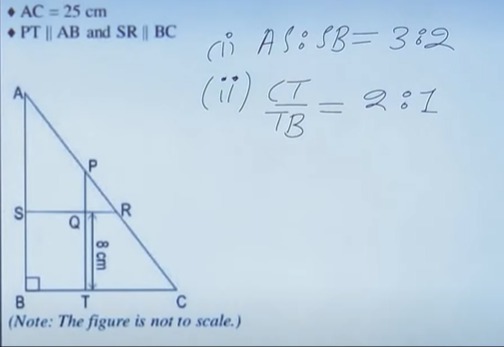Question
Question: AC = 25 cm $\bullet$ PT || AB and SR || BC (i) AS:SB = 3:2 (ii) $\frac{CT}{TB}$ = 2:1...
AC = 25 cm ∙ PT || AB and SR || BC
(i) AS:SB = 3:2 (ii) TBCT = 2:1

AB = 20 cm, BC = 15 cm
Solution
We begin by placing triangle ABC in a coordinate system with the right angle at B. Let
• B = (0, 0)
• A = (a, 0)
• C = (0, c)
Since AC = 25, we have
√(a² + c²) = 25. (1)
Step 1. Locate S on AB.
It is given that AS:SB = 3:2. Write S = (s, 0) with S between A and B. Then
AS = (a – s) and SB = s.
So,
(a – s)/s = 3/2 ⇒ 2(a – s) = 3s ⇒ 2a = 5s ⇒ s = 2a/5.
Thus, S = (2a/5, 0).
Step 2. Locate T on BC.
Given CT:TB = 2:1. Since B = (0, 0) and C = (0, c), let T = (0, t). Write TB = t and CT = (c – t). Then (c – t)/t = 2/1 ⇒ c – t = 2t ⇒ c = 3t ⇒ t = c/3. Thus, T = (0, c/3).
Step 3. Locate P on AC and determine its parameter.
Let P lie on AC. Writing P in the form
P = (a(1 – λ), cλ), with 0 ≤ λ ≤ 1.
A line through P parallel to AB is horizontal. Since PT ∥ AB and T is on BC, the horizontal line through P must have the same y‐coordinate as T. That is,
cλ = c/3 ⇒ λ = 1/3.
So,
P = (a(1 – 1/3), c/3) = (2a/3, c/3).
Step 4. Locate Q and use QT = 8 cm.
We have drawn two lines:
• PT is horizontal (through P at y = c/3).
• SR is vertical (since SR ∥ BC) and passes through S at x = 2a/5.
Their intersection is
Q = (2a/5, c/3).
The problem tells us that QT = 8 cm. Now, T = (0, c/3) and Q = (2a/5, c/3) are horizontal-separated so that QT = 2a/5 = 8 ⇒ a = (8 × 5)/2 = 20.
Step 5. Find c using (1).
Using a = 20 in equation (1): 20² + c² = 25² ⇒ 400 + c² = 625 ⇒ c² = 225 ⇒ c = 15.
Therefore, AB = 20 cm and BC = 15 cm.
